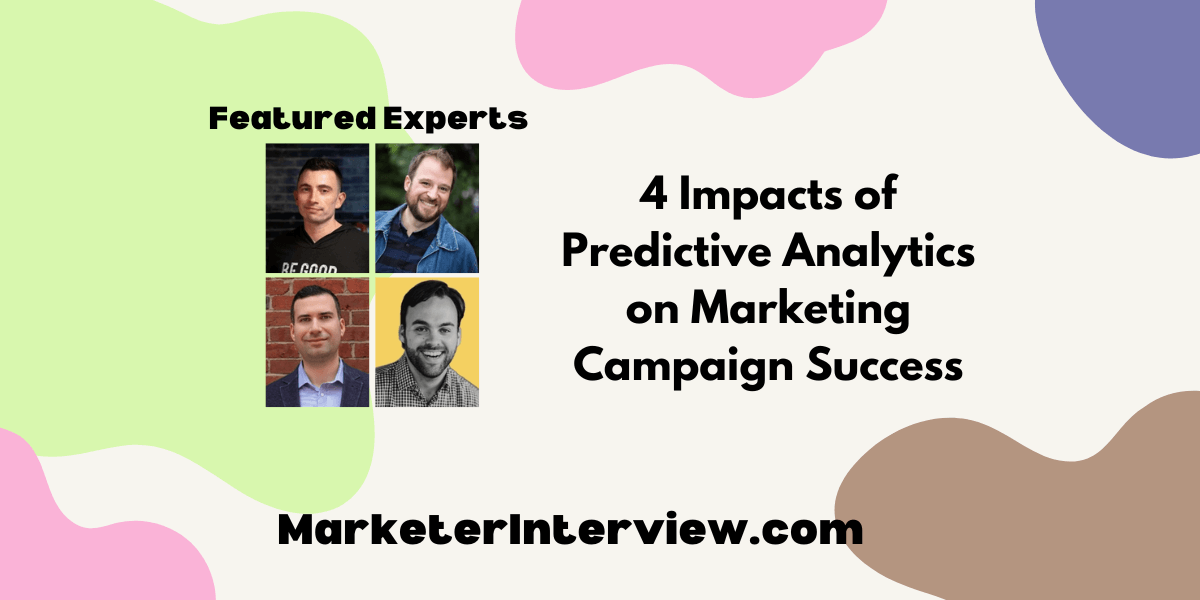4 Impacts of Predictive Analytics on Marketing Campaign Success
In the dynamic world of marketing, predictive analytics can pivot a campaign’s trajectory towards success. We sought insights from founders and CEOs on how they’ve harnessed such models to reshape their strategies. From focusing on MQL sales goals to applying random forest for audience insights, discover the transformative effects through these four expert applications.
Want to get quoted in MarketerInterview.com content just like this? Apply to become a contributor today!
Contents
Focus on MQL Sales Goals
It seems simple, but most companies do not do an adequate job—or any job at all!—practicing predicting the future. The best predictive analytic model is the one that predicts the single biggest outcome.
For example, that could be the model that predicts whether the team is on track to hit the MQL or sales goal. The precursor KPIs or measurables are helpful to track, too, but it is the most important KPI that needs the focus.

Casey Slaughter Stanton, Founder, CMOx
Implement Customer Segmentation Model
In one of our key marketing campaigns at Reefertilizer, we implemented a customer segmentation and prediction model. This approach allowed us to forecast purchasing behaviors based on past interactions and demographic data. By analyzing this information, we tailored our messaging and product recommendations to match the anticipated needs of different customer groups.
This personalization led to a noticeable increase in engagement and conversion rates. It confirmed the importance of leveraging data to anticipate customer needs and preferences, making our marketing efforts more relevant and effective. This experience not only reinforced my belief in data-driven strategies but also showed the personal satisfaction that comes from seeing direct, positive outcomes from your efforts.

Mike Drouin, Co-founder, Digital Marketing Director, Gardening & Home Improvement expert- Reefertilizer, Reefertilizer
Utilize Decision Tree for Personalization
In this particular instance, I utilized a machine-learning model known as a decision tree to analyze data from past client interactions and website visits. The decision tree algorithm is a popular method for classification and prediction tasks in data mining and is particularly useful for identifying patterns within complex datasets. With this model, I was able to identify key factors that influenced a potential buyer’s decision to purchase a home, such as their age, income level, and location preferences.
By using this model, I was able to personalize my marketing strategies for each potential buyer based on these factors. For example, if the data showed that a particular buyer had a high income and preferred luxury homes in a certain location, I would tailor my advertisements and listings to showcase these types of properties.
Furthermore, the decision tree model allowed me to predict which potential buyers were most likely to convert into actual clients. This information helped me prioritize my efforts and focus on targeting those individuals who were more likely to make a purchase. As a result, the campaign saw an increase in leads and conversions, ultimately leading to a higher ROI.

Keith Sant, Founder & CEO, Kind House Buyers
Apply Random Forest for Audience Insights
Random Forest is a powerful predictive analytics model that I have applied in several marketing campaigns. This model uses an ensemble of decision trees to make predictions and has proven to be incredibly accurate in predicting customer behavior. By using Random Forest, we were able to gain valuable insights into our target audience’s preferences, characteristics, and purchasing patterns.
These insights allowed us to tailor our marketing campaigns to better resonate with our target audience, ultimately resulting in increased sales and revenue. Moreover, the Random Forest model also helped us identify key customer segments that were more likely to convert, allowing us to prioritize our marketing efforts for maximum effectiveness.

Pavel Khaykin, Founder & CEO, Pavel Buys Houses
Want to get quoted in MarketerInterview.com content just like this? Apply to become a contributor today!






